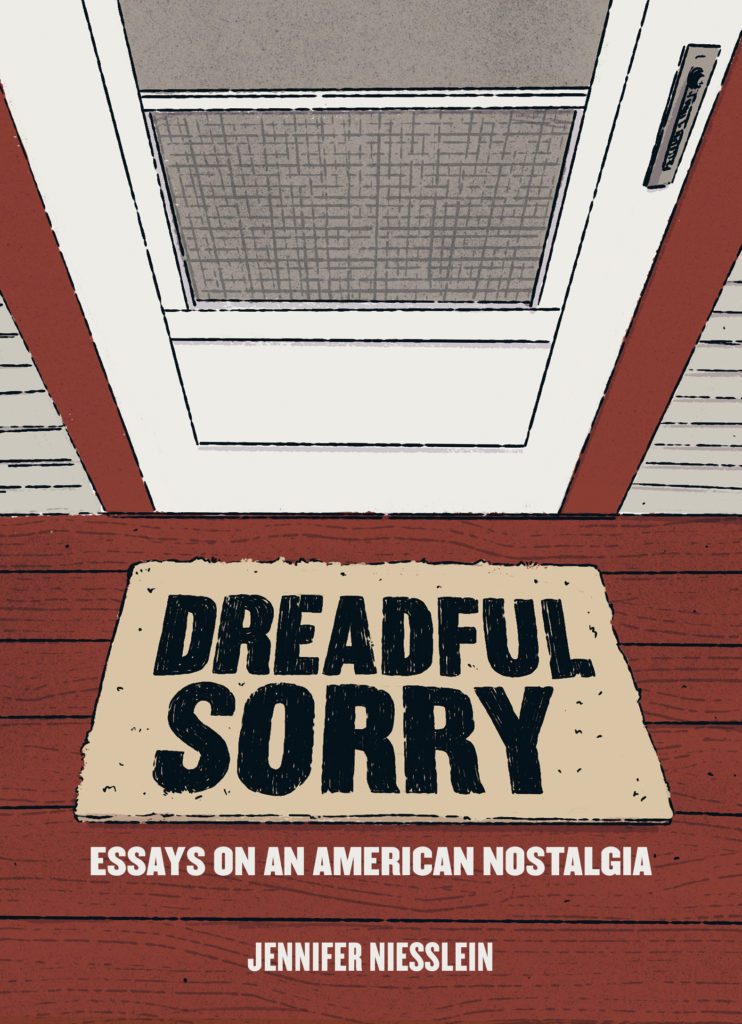
buy it!
Direct from Belt Publishing
New Dominion Bookshop in Charlottesville, Virginia
Or wherever you like to buy books
Advance Praise
“Jennifer Niesslein’s fearless, beautiful, “Dreadful Sorry” takes on American myths, childhood memories, family history, and ghosts personal and public with wit, love, and a journalist’s flair. “Dreadful Sorry” invites us to consider the nostalgia we create for future generations. This book is a wonder in all the best ways.” —Jessica Handler, author of The Magnetic Girl
“In this time of reckoning around race, the past, the present, and the future, Niesslein looks inward, and the result is a candid, unflinching, deeply personal meditation on whiteness, family, and history. These essays are revelatory, raw, and real, everything good storytelling should be.” —Deesha Philyaw, author of The Secret Lives of Church Ladies
“Niesslein’s brilliant ancestral memoir is both searchingly personal and slyly political, and it asks the hardest questions about privilege and its haunting, murderous history. It’s a book about longing for the past even as it’s also a meditation on the dangers of that very longing, and it’s also just a totally delightful read: wryly hilarious and candidly, quietly illuminating. I loved it.” —Catherine Newman, author of Waiting for Birdy and How to Be a Person
About Dreadful Sorry
Candid essays on personal and cultural American nostalgia, focusing on the author’s working-class, Rust Belt family history.
What does it mean to be nostalgic for the American past? The feeling has been co-opted by the far right (“Make America Great Again,” after all, is a plea for the past), and associated with violent periods of our country’s history when white supremacy was even more dominant than today. Can a liberal white woman still be sentimental about her childhood, her European immigrant family history, her working-class upbringing?
In Dreadful Sorry, Jennifer Niesslein explores her “nostalgia problem” with grace and curiosity. The essays recount her thoughts upon rewatching Little Women with her sisters and mother, her hand-to-mouth childhood, the effect being “not the right kind of white” had on her Polish immigrant ancestors in the U.S, and her family’s own racism. Niesslein weaves together personal and structural questions of class, whiteness, history, and family with humor and charisma.
A book for anyone who wants to think about their relationship to their childhood, family history, and place.
appearances (that sounds unintentionally cryptic)
March 5, 7-8 p.m.: New Dominion Bookshop in Charlottesville
March 17, 2-3 p.m.: Virginia Festival of the Book in Charlottesville (watch online anytime)
reviews and interviews
“Jennifer Niesslein is aware of the risk of deflection. She’s often at her best when she approaches her subjects in a sidelong way, examining her biases through analysis of culture, sobering research, or tensions with extended family, sneaking up on the ways our desires and memories are shaped by the web of influences around us.” —Dorian Fox in The Los Angeles Review of Books
“How does a self-proclaimed nostalgic square her affection for the past with progressive politics? How can one remain a nostalgic American when others use that sentiment for ill intent? Jennifer Niesslein, editor of Full Grown People, addresses these and other issues in her exciting new collection Dreadful Sorry: Essays on an American Nostalgia. She spoke with me about race, class, family, humor, and Little Women for the Brevity blog.” — “Of Book Burning, Nostalgia, and Little Women: An interview with Jennifer Niesslein” by Brooke Champagne on the Brevity blog
“Niesslein is a nuanced thinker, and she honors the tremendous complexity of nostalgia in the nine essays contained within this book.” —Beth Kephart in Cleaver
“In a series of deceptively sly essays about seemingly slight topics — a family road trip, a favorite movie, a class reunion — Niesslein probes what it means to remember, and what it means to forget.” —Brian O’Neill in the Chicago Review of Books
“[An] inviting and down-to-earth collection. [. . .] With honesty, humor, and an earnest passion that shines through her words, Niesslein reflects upon stories of the past with the hope of a better future.” —Kait Walser in Hippocampus Magazine
“Dispelling the haze of American nostalgia matters, and in Dreadful Sorry, Niesslein shows how it can be done, particularly by those of us who are white—and that, after it is stripped of sentimentality, nostalgia can be a force that drives us to make a beloved place better.” —Rachael Nevins in Ploughshares